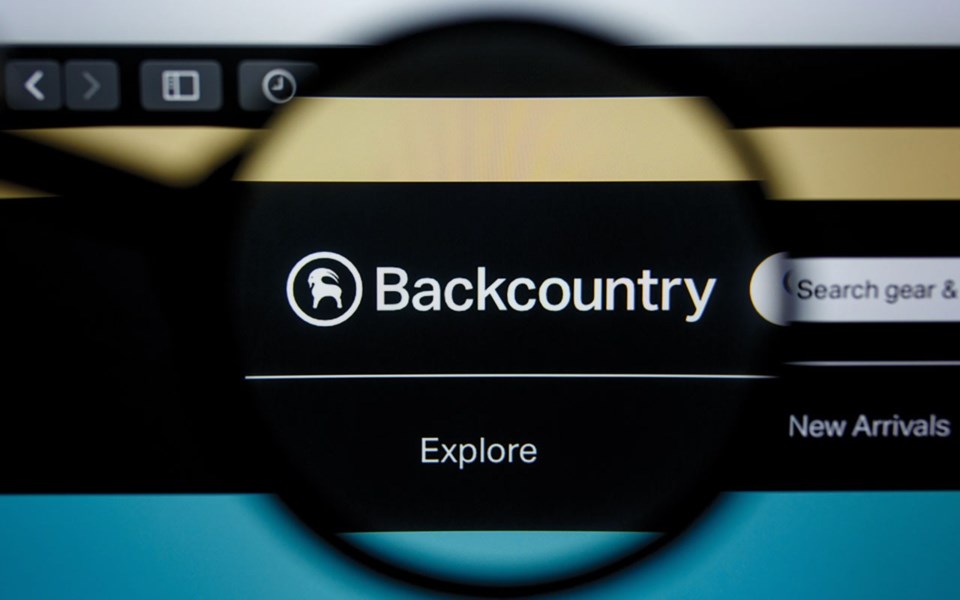If you've ever shopped for ski gear online you've probably heard of the online retailer Backcountry.com. Its iconic mountain goat logo sticker can be found on everything from skis to truck windows, especially in ski towns south of the border. In the last few weeks, however, this successful online enterprise has experienced massive blowback from the online community after a scathing story in The Colorado Sun reported Backcountry.com had pursued trademark lawsuits against all manner of small businesses that used the word "backcountry" in their own business name.
Like many mountain town success stories, Backcountry.com had humble beginnings, with Jim Holland and John Bresse selling avalanche beacons out of a garage in Park City in 1996 under the original domain names BCstore.com and BackcountryStore.com. The company purchased the domain name backcountry.com in 2004 for US$75,000, at which point online purchases of sporting goods equipment accounted for less than three per cent of total purchases in that category.
Things have certainly changed since then. Online sales have slowly edged out mom and pop ski shops all over the world; the once-niche sport of backcountry skiing has exploded in popularity; and in 2007, the online retailer backcountry.com decided it would call itself simply "Backcountry" by securing its first registration of a service mark (similar to a trademark but used to differentiate the company from its competitors, in many cases in the form of a slogan).
Backcountry (I'll refer to them as such henceforth, to avoid a lawsuit of my own) has also experienced rapid growth over the last 20 years, acquiring other successful online retailers such as bergfreunde.de, motosport.com and Competitive Cyclist and in turn being acquired by larger parent companies, most recently by corporate conglomerate TSG Consumer Partners.
Backcountry has big plans to expand its own in-house branded products (think MEC) and in turn has expanded its service mark scope by applying for trademarks on hundreds of types of outdoor gear, from heart rate monitors to mountaineering equipment.
And herein lies the source of all these ridiculous-sounding lawsuits. Backcountry wants to apply its own name to every type of outdoor product and if you happen to have a company or product that conflicts with that, they've probably sent you a cease and desist letter. The ones reported thus far are Backcountry Denim (which makes jeans), Backcountry Nitro coffee, Marquette Backcountry Ski and even the company Constellation Outdoor Education, which trademarked the name Backcountry Babes for clinics offering women-focused avalanche education courses. In the case of Marquette Backcountry Ski, The Colorado Sun reported that Backcountry demanded three times all the profits he's ever made selling the Marquette Backcountry Ski as well as legal fees and a penalty. The excerpt from the lawsuit read: "Backcountry requests punitive or exemplary damages ... in an amount sufficient to punish and deter defendants and to make an example of them."
Popular outdoor brands such as REI, Patagonia and YETI coolers have all enacted similar trademark lawsuits against similarly-named competitors, yet the Backcountry debacle stands above them all. When you look at it objectively and without emotion, Backcountry is simply protecting its intellectual property. Interestingly, it hasn't touched the brand Backcountry Access (which makes avalanche safety gear and is a large supplier to Backcountry for these products). That could be because of the potential business conflict or the risk in taking on another large corporate legal team (Backcountry Access was bought by ski brand K2 Sports, which is in turn owned by private equity firm Kolhberg & Co.)
Backcountry CEO Jonathon Nielsen broke his silence last week, stating publicly that his company's perceived conduct in the media is "not reflective of how we behave in the market, how we treat partners, and how we treat people. We were never holistically trying to own the term 'backcountry.'"
His actions were no doubt fuelled by a global #BoycottBackcountry movement on social media (including a Facebook group of more than 19,000 members). Nielsen came out again on Nov. 8, 2019 stating that the company had fired its California-based trademark law firm, dropped any outstanding lawsuits and was beginning to mend the bridges with the companies affected by its recent legal actions. So chalk one up for the internet doing some good last week and keeping corporate values in check.
With so much corporatization permeating the outdoor industry, how can we help prevent these sorts of unnecessary, heavy-handed tactics? I asked Squamish resident Victoria Farrand, who led a #BoycottBackcountry initiative to reclaim the internet search term "backcountry" from the company in question.
"Vote with our dollars," she said. "Businesses exist because we buy what they sell. Every wallet is powerful, no matter the size. Decrease the influence of companies who don't align with your values by helping to grow new, healthy competition which does. If we want to see more corporate responsibility we have to invest in it. Every dollar we spend at a company makes us an investor in the future of the industry. We can all choose who is the future of the outdoor industry. The question is: what kind of future do we want?"
Vince Shuley encourages you to shop local. For questions, comments or suggestions for The Outsider email vince@vinceshuley.com or Instagram @whis_vince.




